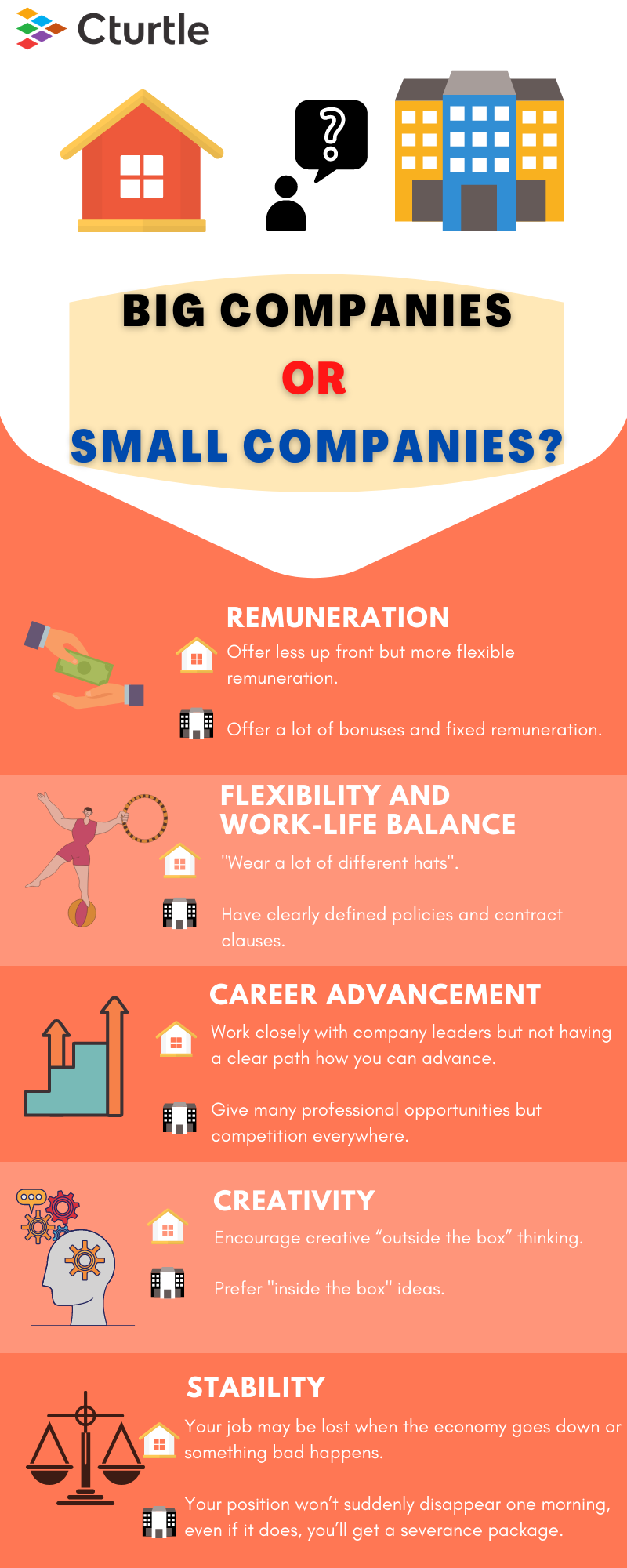Much like choosing a college or city, choosing whether to work for a big or small company can impact the quality of your life. Choose a big company, and you may have endless opportunities for advancement. But, you may have to try hard to be noticed. Work for a small company, and there may be a greater sense of community and “family,” but you may stay “stuck” in the same position year after year. Small companies or big companies, which one is better?
There’s no one right answer for which is better. However, there are pros and cons to working for big and small companies to consider. Knowing the differences between them can help you better target your job search and help make sure you don’t end up at a company where you don’t thrive.
1. Remuneration and benefits
If quality candidates are in short supply large companies might tip the balance in their favour and outperform smaller organisations with excellent benefits packages. Private health care, company vehicles, salary sacrificing and discounted services can all be put on the table to sweeten an offer to a sought-after candidate.
Smaller businesses may sometimes seem to offer less up front. However, it can be more open to flexible remuneration such as bonus or commission structures, profit sharing or an ownership stake in the company.
2. Flexibility and work-life balance
Larger companies might have clearly defined policies and contract clauses such as allowing an employee to work a certain number of hours per week from home, or altered start and finish times to accommodate childcare arrangements. They may also tend towards requiring a fairly consistent number of hours from employees each week, with extra hours paid as overtime. The downside can be less flexibility outside the agreed parameters of a contract or an HR policy, so altered requests for flexible hours are harder to accommodate.
Smaller organisations might require more flexibility from their staff at times, but a closer working relationship with employees means they’re potentially able to give more in return when it’s needed. A smaller team naturally has to band together to meet deadlines when the workload is high, so staff may find themselves working many hours some months but able to take time off or reduce hours when things are quieter.
Ultimately, work/life balance is something which will vary significantly between companies, with an organisation’s size not always an indicator of their approach to the issue.
Related to: How Employees Can Readjust to Office Life
5 Ways To Accelerate Your Career During Uncertain Times
3. Career advancement
Candidates who aspire to partnership or senior management in large organisations will be more inclined to value working for a company with a respected and well-known name. In large national or multinational firms, it can be easier to see a path for progression and promotion up the ranks. Plus, larger businesses may offer structured mentoring programs to develop less experienced staff and expose them to networking opportunities with the senior members in their industry.
At a small company, you should have a job description. But, the odds are pretty good that you don’t have much else. Small companies don’t usually have a list of accomplishments you have to achieve before you get a promotion or even a raise. This means you may not have a clear road map of how you can advance your career or even what the next step at the company is for you.
4. Creativity
For a time, “thinking outside the box” was a big trend in business. It encouraged original and free thinking to help employees and leaders come up with new solutions to problems, instead of doing things “as we’ve always done them.” The truth, though, is that many large companies don’t like to think outside the box. Large companies are usually less open to change because they are risk-averse. While this caution helps maintain company stability (a pro), it does mean that large companies are slow to change. It can take forever to get things done thanks to the corporate structure, defined policies, and outlined procedures.
Small companies tend to encourage creative “outside the box” thinking and are more likely to embrace change and even radical ideas. While this may be due to a lack of resources, being able to apply creative solutions allows you to shine as an employee, and lets you test out theories and find answers quickly.
5. Stability
While any company can find themselves on the wrong side of the economy, large companies tend to be stable. The odds are pretty good that your position won’t suddenly disappear one morning. And, even if it does, there’s also a good chance that you’ll get a severance package if you are laid off.
On the contrary, when the economy goes down or something bad happens, your position may be lost easily.

Like this? Read more other interesting topics HERE
https://www.flexjobs.com/blog/post/pros-cons-working-large-companies-v2/






Recent Comments